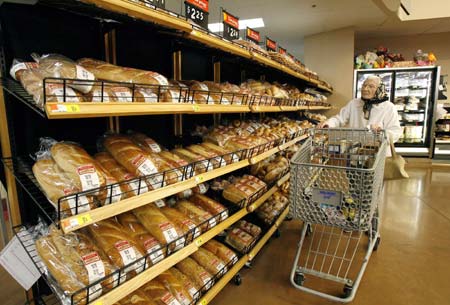U.S. economy will slide into "amid recession" in 2008 in the face of a major financial crisis as the global economy is losing speed, according to the World Economic Outlook released by the International Monetary Fund on Wednesday.

A shopper browses the bread section at a Wal-Mart store in Santa Clarita, California April 1, 2008. Already squeezed by high gasoline prices, slumping home values, a weakening job market and the possibility that the U.S. economy is in a recession, consumers have adopted a no-nonsense approach to shopping, passing over a trip to Target or a local grocery store if they can find lower prices at Wal-Mart. Picture taken April 1, 2008.
"The U.S. economy will tip into a mild recession in 2008 as the result of mutually reinforcing cycles in the housing and financial markets, before starting a modest recovery in 2009 as balance sheet problems in financial institutions are slowly resolved," said the report.
Activity in western Europe is also projected to slow to well below potential, owing to trade spillovers, financial strains, and negative housing cycles in some countries, it said.
By contrast, growth in emerging and developing economies is expected to ease modestly but remain robust in both 2008 and 2009.
"The slowdown reflects efforts to prevent overheating in some countries as well as trade and financial spillovers and some moderation in commodity prices," said the report.
The global economy is projected to slow to 3.7 percent in 2008,0.5 percentage point lower than at the time of the January World Economic Outlook Update and 1.25 percentage points lower than the growth recorded in 2007.
The largest downward revisions to growth are in the United States, which is now expected to grow at 0.5 percent in 2008. Japan, the world's second-largest economy, is poised to slow to pace of 1.4 percent this year with little improvement at 1.5 percent in 2009.
The IMF has also cut its growth forecast for Canada from 1.8 percent to 1.3 percent. The euro zone is expected to post growth of 1.4 percent in 2008, down from the 1.5 percent forecast earlier.